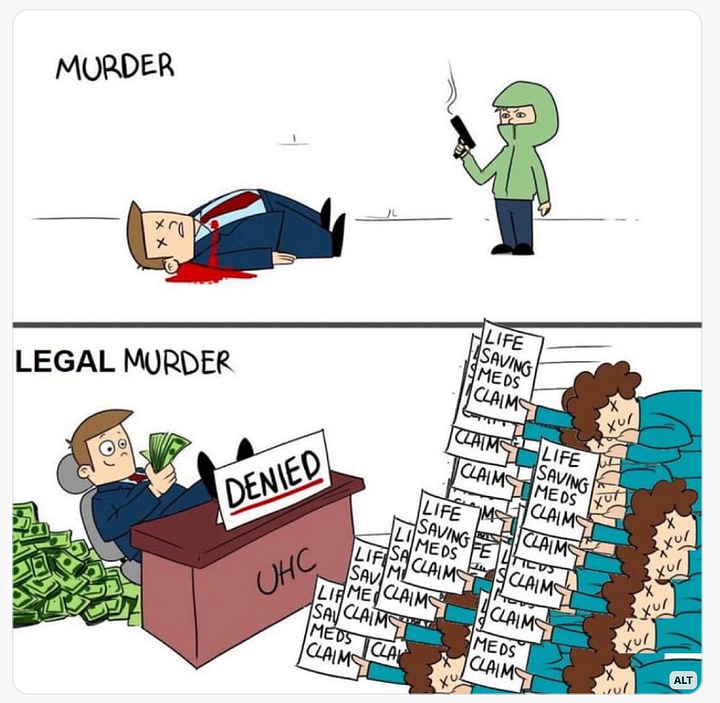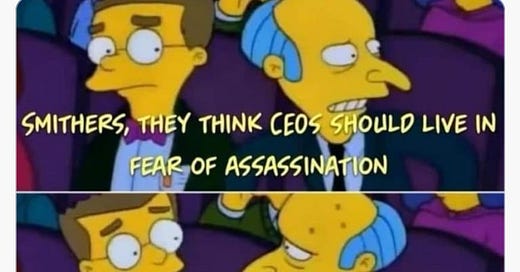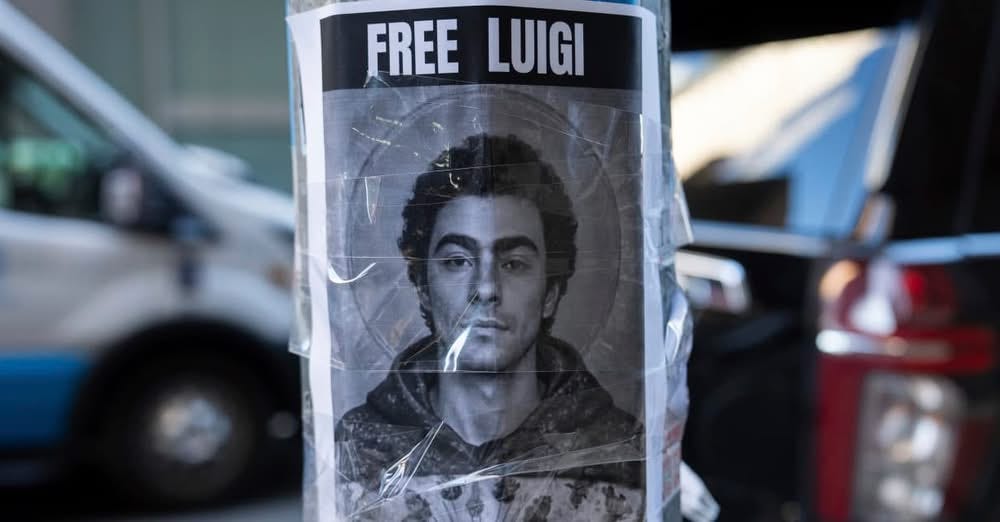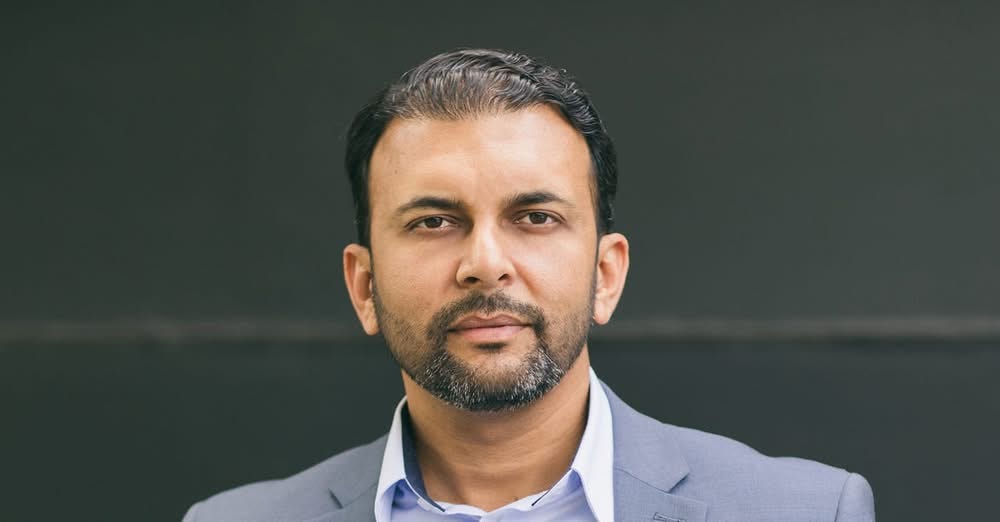The memes and jokes about the irony of the head of America’s most niggardly health insurer being assassinated quickly devolved into social media posts recommending CEO murder as a reasonable strategy for change.
As this evolution proceeded, an opposing line of reasoning took flight. It was better to negotiate — or try absolutely anything else — than shoot people down.
Considering that the authors of any of this are extraordinarily unlikely to act in any way close to what they suggest, the jokers and imaginary killers win the electronic struggle, triumphing over the virtuous naggers.


The gent on the left of both memes is supposed to be the late UnitedHealthcare CEO Brian Thompson.
It’s a slam dunk. The shooting of Brian Thompson elicited the first real demonstration of just how much Americans resent the health insurance system. If so many people hadn’t dipped their toes into appreciation of murder, that point would not have been made so dramatically to the insurers, as well as the leeches who run this country at the convenience of its major corporations.
After all, Thompson was the only one from his firm who was killed Dec. 4. If not that day, there were likely other recent days when more than one patient died as a result of being denied care by Thompson’s UnitedHealthcare. UHC reportedly rejects more claims than any other firm.
Roughshod claim denial has been going on for generations, and so has negotiation to try to moderate that. But patients don’t win much.
“You can only push people so far,” said U.S. Sen. Elizabeth Warren, D-MA. “Then people take things into their own hands.”
Not only are some people laughing off Thompson’s slaying, but there seems to be little public mourning. When was the last time you saw a public death site that wasn’t festooned with flowers and stuffed animals?
Conversely, the health insurers have been put on notice. More than they’re watching out for the safety of their executives, they realize the public is watching them. Very critically.
“If the killing of the UnitedHealth CEO has taught us one thing, it’s that we're maybe not as divided as we think,” Qasim Rashid, a Pakistani-born Illinois politician, said. “When 90% of people empathize with the people the CEO exploited more than with the CEO, it should tell our politicians something. Stop bowing to billionaires & actually work for the people.”
Qasim Rashid, politician, author and attorney, Naperville, IL
This is America’s chance to get the end of the wrecking bar under the lip of managed care. It’s the time to stick up for Medicare and Medicaid despite a new presidential administration that has promised to carve into them.
Maybe it’s the time for single-payer. Bigger mountains have been scaled before.
The day after the shooting, Anthem Blue Cross Blue Shield withdrew its bizarre plan to stop paying for anesthesia when surgeries lasted longer than the firm deemed fitting.
The plan was intended to reduce the time charged by anesthesiologists, which bean-counters maintained seems higher than necessary. It would have taken money out of the pockets of anesthesiologists, not ours. But when was the last time a health insurer backed off that quickly? The Fifth of Never?
The Anthem Blue Cross bosses originally thought they could get away with the scheme even though the anesthesiologists would paint them as criminal. But they fear the stockholders much more than they fear the people working in the operating theaters.
Until now, they didn’t fear the people getting the operations at all. Sometimes the poor saps working the phones feel bad about the care that’s being denied, but they tell themselves they’re paid to feel bad.
They’ll sometimes say so if you ask them.
I recently called the insurance company that has three times cancelled my physical therapy, to ask them why they keep doing that. The poor mopes on the other side of the calls all expressed surprise. Then their voices got a little timorous. Then, at the exact same point in the discussion, they each switched me over to the recorded poll that asked me to rate my experience.
I rated the experience, for what it was worth. Click.
The day after Thompson’s alleged killer, Luigi Mangione, 26, was arrested, Daniel Penny, also 26, was found not guilty of criminally negligent homicide in the death of an annoying but probably harmless nut in a New York subway. Penny, an ex-Marine, apparently elected to cut off the guy’s airway for six minutes or until he was dead, whichever came first. Both occurred at about the same time.
Jordan Neely, a loudmouthed homeless Black guy, reportedly never touched or directly threatened anyone that day. But defense lawyers made the jury feel Penny’s supposed fear instead of his stupidity and lack of empathy.
You don’t have to kill people like Neely. At least twice in my rapid transit-riding career, I informed similar individuals that at the next stop, I’d be escorting them off the train. Each time, as the doors opened, at least one of my fellow passengers helped to do just that.
Several other times, the goofs quickly moved into the next car. Crazy like foxes.
But just off-loading train screamers doesn’t have much of a deterrent effect. I guess killing them does. You’d have to ask the people who rode the rails after Neely was strangled, or after Bernhard Goetz shot four teenagers on the subway in 1984. He got acquitted, too.
Daniel Penny has a lot of memes supporting him, too
As I write, Penny is riding not on public transit but in a fancy car with Donald Trump and J.D. Vance, to the Army-Navy football game. He’s their honored guest.
The questions this dichotomy presents is obvious. Who gets to kill people? Whose life is more important?
This time, I don’t think it’s Neely’s life, or Thompson’s, either. Not their killers. For the answer to whose life is most precious, I’ve considered the Vietnam War protests of over 50 years ago.
Some Americans professed distress about the lives of the Viet Cong, but that wasn’t the primary concern of the young men carrying signs and making the most noise.
They might have been remembering other signs, ones they had seen on factory floors. Those signs carried the same message anybody who has had the misfortune to deal with health insurers may be pondering now, as they consider finally seeking change.
The old signs suggested working smart and effectively because health was constantly at risk. If everybody doesn’t pitch in, the future may be bleak.
The life you save may be your own.











Nice to have you back, Irv. I hear your heart.
Appreciate you! Clarity and compassion